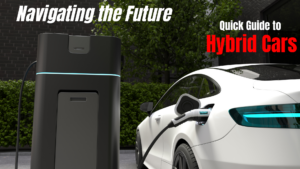The modern car is a technological marvel that has become our primary mode of transportation for our everyday commute. Its internal combustion engine powered by fossil fuels gets us where we need to go.
However, the U.S. Energy Information Administration (EIA) estimates the world’s fossil fuel reserves will be depleted by 2050. As a result, the automotive industry is pushing for more technological innovations that preserve fuel economy or eliminate fossil fuel reliance altogether.
This is where hybrid cars become a suitable solution. But what is a hybrid car, and are they really fuel-efficient? Let’s find out.
What is a Hybrid Car?
Hybrid cars are vehicles that have multiple sources of power: an internal combustion engine that runs on gasoline, an electric engine that supplies electric power, and a hybrid battery. Depending on the driving situation, these vehicles can shift their usage between the combustion engine and the electric motor or even use both simultaneously.
Unlike fully electric vehicles, hybrid cars do not actually have to be plugged in to charge their electric motors. Instead, they are charged automatically through regenerative charging as well as through the combustion engine. However, this isn’t always the case.
As the technology behind hybrid cars continues to advance, it gets even harder to answer the question: “What is a hybrid car?” This is due to the existence of different types of hybrid cars that alter their previous definition:
- Parallel Hybrid: This is the most common design among hybrid cars, which blends its two sources of power. Two of the best hybrid cars in the market, the Toyota Hybrid Prius and the Chevrolet Volt, fall under this category.
- Series Hybrid: In this type of hybrid, the car’s primary power source is its electric motor, with the gasoline engine only serving to recharge the battery. What results is a driving experience similar to that of a fully electric car. This type is present in some of the best hybrid cars today, including the BMW i3.
- Plug-In Hybrid: This comes with a larger battery pack that must be recharged using an external power source. This allows for an extended fully-electric driving experience, which reverts to the conventional type once the battery pack is depleted. Cars that belong to this type can also either be a series or a parallel hybrid.
All of the above types are considered fully hybrid. Another category is called the mild hybrid, which means the electric motor cannot move the car by itself and is only there to assist the gasoline engine.
Should You Make the Switch?
According to the 2022 Automotive Trends Report by the Environmental Protection Agency (EPA), the average fuel economy for 2021 light-duty vehicles was 25.4 miles per gallon (MPG) — an all-time high. For context, the average fuel consumption for similar light-duty vehicles in 1975 was a little over 13 miles per gallon.
This means cars today are already more fuel efficient than they were 48 years ago. However, since the advent of hybrid cars through the mass production of the ever-popular Toyota hybrid in 1997, fuel efficiency has improved dramatically.
Through hybrid technology, the average mileage for an SUV can get as high as 35 MPG, while hybrid sedans can go even higher at 45 MPG. With gas prices as they are today, hybrid cars are looking like the best choice for most consumers.
Berryman Products, Your Partner in Fuel Efficiency
For over 100 years, Berryman Products has been a go-to partner for motorists and car enthusiasts worldwide. From fuel additives to other maintenance products, we provide high-quality products that keep your vehicle in tip-top shape.
Keep your car running smoothly and ensure a pleasant driving experience with Berryman Products. If you would like to know more about how we can help you maintain your vehicle’s pristine condition, don’t hesitate to reach out to us.

